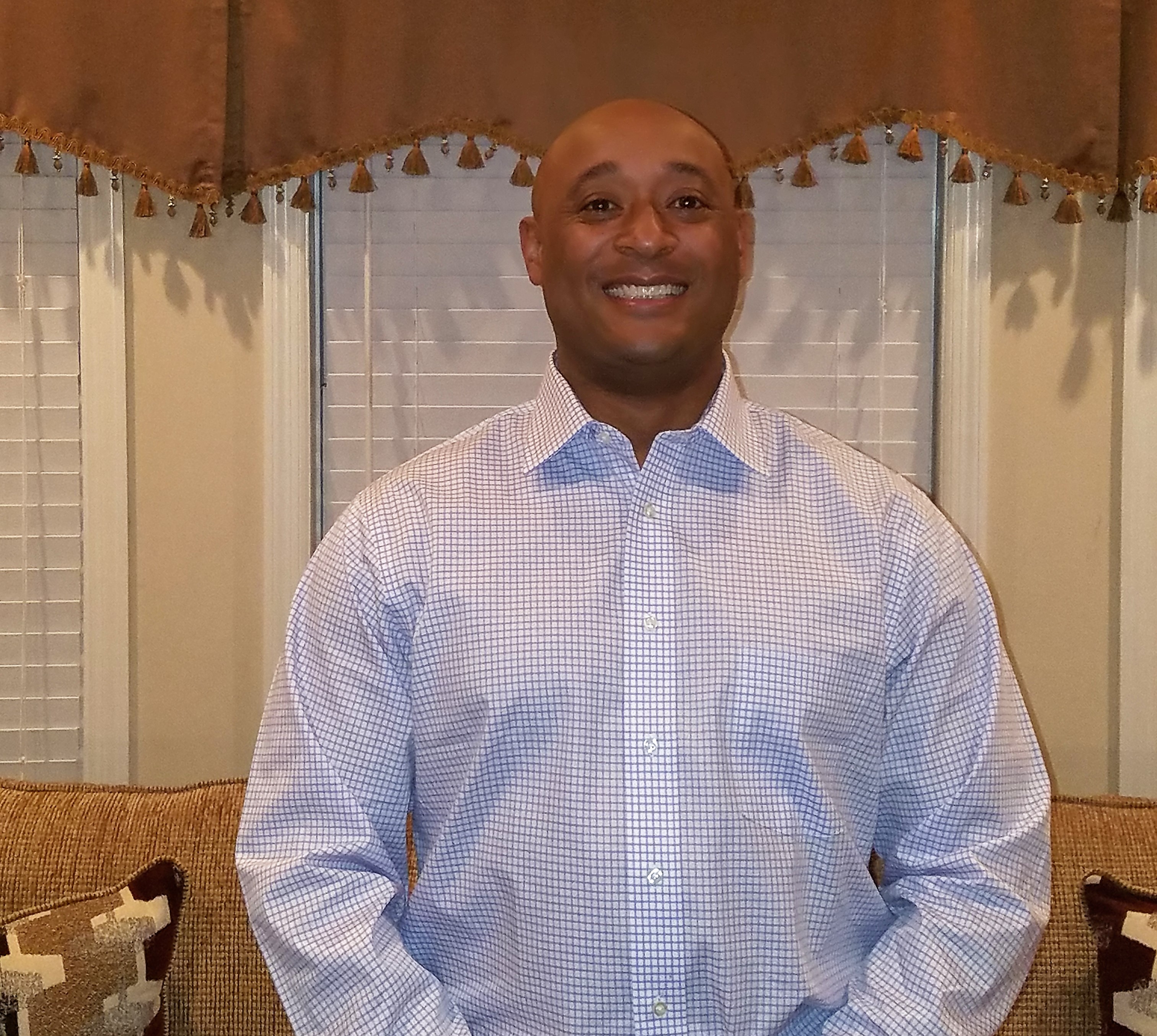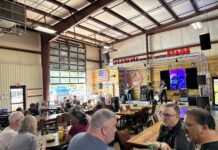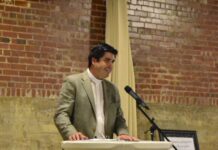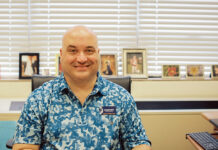Mount Hope, Alabama native Quincy Jackson was in charge of the White House staff kitchen during the terms of three U.S. presidents- Bill Clinton, George W. Bush and Barack Obama, and served as personal presidential valet to President Obama.
History of the White House Mess
The interesting history of the White House Mess is printed on the back of every menu:
"It has been recorded as far back as 1880 aboard the Presidential Yacht Despatch, while President Rutherford B. Hayes was in office, that Navy Stewards were first utilized to provide food service to the Commander in Chief. Since that time, the Navy has assigned their best Culinary Specialists to the Presidential Food Service to prepare the finest foods and provide outstanding service for the President throughout the world.
In 1942, President Franklin D. Roosevelt established the Presidential Retreat tucked away in the Catoctin Mountains and named it "Shangri-La" (Renamed Camp David by President Dwight D. Eisenhower in 1953 in honor of his grandson David). President Roosevelt directed the Navy to provide messing services at "Shangri-La" and that Navy Stewards from his yacht USS Potomac operate the facility. This established the precedent for Navy Personnel to serve the President and his staff ashore.
In 1951 while President Harry S. Truman was in Office, Rear Admiral Robert L. Dennison, Naval Aide to the President, recommended a Commissioned Officers Mess be established at the White House. On June 11, 1951 the Presidential Food Service was established under the guidance of Lieutenant Commander Leo W. Roberts, SC, USN; Presidential Mess Officer aboard USS Williamsburg. Following several decades of naval tradition and pride in direct support to our nation's President, the Presidential Food Service functions much the same way it did in its earlier years.
During its prestigious history, the Presidential Food Service has received seven Joint Meritorious Unit Awards, the Navy Unit Commendation and the Meritorious Unit Commendation for continuous outstanding performance in direct support to the President of the United States."
Credit: whitehouse.gov1.info/white-house-mess/
It was into this proud tradition that a young north Alabama Navy chef by the name of Quincy Jackson entered into a career which would span the administration of three presidents, each of them holding office for two terms. But Jackson’s story doesn’t start there – it begins in rural Lawrence County, located in the northwestern corner of the state.
Some people have their lives all mapped out from a young age, knowing what they want to do after graduating high school and college, and then proceeding straight on into their selected careers. Mount Hope’s Jackson was not one of those people.
Jackson graduated from Mount Hope High School in 1989, having no vision for his future other than taking some woodworking/ cabinet making courses at Northwest-Shoals Community College. He excelled in the skill so quickly that he actually became bored. In a conversation about Quincy’s abilities, his instructor mentioned to Quincy’s father that he could probably teach the class, he was so far advanced even in the beginning of the semester.
“I just got bored with it,” said Jackson in an interview from Washington, D.C. recently. “I became idle and felt unchallenged,” he admitted. “I think people always need to be challenged.”
Those were profound insights at the time, coming as they were from an 18-year-old, and they proved to be true. Jackson would by some twist of fate, or a maybe guidance from a divine hand, go on to experience a career that would take him from his home in rural Lawrence County to the pinnacle of success that could very well be a movie script.
Although he had an innate craving to create things with his hands, he came to the conclusion that his future didn’t include woodworking. After a period of restless indecision Jackson finally agreed to talk to a Naval recruiter who visited the Jackson home in the summer of 1989.
“At the time, I was just all over the place in trying to decide what path to take,” said Jackson. “I thought about electronics, and even signed up for a Devry University course, which cost my parents a hundred dollars. I was attracted because they promised a job at Toys R Us,” he laughed. “When the recruiter came he sat in the living room talking with my dad and me about my scores on the Armed Services Vocational Aptitude Battery (ASVAB) exam.”
Glense Jackson advised his son that he would have made the Army his career, so the younger Jackson, who wanted to gain the approval of his father, decided that even though he had never considered the military, and he couldn’t swim, he would join the Navy. Before he knew it, he was on his way to Nashville to be inducted.
By Sept. 11, 1990, he was finishing up boot camp in San Diego, California. “My home for the next four and a half years was aboard the USS Denver,” recalled Jackson.
He was a hard worker, figuring that if he did his best someone might notice. He was right…
One day he got a call to meet with the ship’s food service officer. “What have I done?” he wondered, as he sat waiting nervously for the meeting to begin.
“The team leader and I were noticing what a hard worker you are,” the officer told the young seaman. “Would you like to work in food service for the executive officer of the ship?”
Not knowing exactly what that involved, Jackson agreed to accept the position, which put him on the 01 level of the ship, where he would work for the next year and a half, serving the executive officer, second in command only to the ship’s captain. “I had been cooking for 1,200 Marines before this promotion, or cooking for 400 people in the ship’s galley, but now I was cooking for one person and his guests,” Jackson explained.
As a young child, Jackson often surprised his family by baking cakes in the middle of the night. When they got up for breakfast there would be a cake waiting for them. He liked cooking, and now sees that it was another way of creating things with his hands, only with food instead of wood. “I like seeing people satisfied with their food, making them feel good,” he said. The family always had a garden, so he already knew most of the basics when it came to growing and preparing food.
He got his next opportunity when the cook for the ship’s captain retired. “Within two years they moved me up to cooking for the captain, for whom I had the upmost respect,” said Jackson. “He was a nice man with a great sense of humor.”
At one point, the captain whispered to Jackson, “Word has it that I’m speaking to a third class petty officer,” which indicated to Jackson that another promotion was in the wind. He was correct in that assumption.
Chef Jackson by this time, his duties included planning menus for the three captains over the next few years. Every single day he tried to be more creative with his meals, making them different, interesting, tasteful and nutritious, and his presentation skills were impressive. Often, according to where they were in the world at the time, he would visit local markets, acquiring fresh produce for the captain’s table. He was now challenged, and he loved every minute of it. “Working for a captain meant that I had to learn his palette; this was the premier job on the whole ship, it was a one of a kind job, so there was no one standing over me. My job was to keep the captain happy,” he said.
Over the years, Jackson learned to make various cultural dishes, but that first captain, he says, was a “biscuits and gravy” kind of guy, so he was easy to please. He also learned to cook healthy foods, and on occasion, called his mother, Rosie, for advice and recipes. “We were at sea most of the time and couldn’t communicate, but when I had the chance I would get tips from mom,” he said.
From the ship, Jackson saw the world. He might be in Dubai, where he could attain fresh couscous, a type of North African semolina in granules made from crushed durum wheat, from which he created a spicy dish made by steaming or soaking couscous and adding meat, vegetables or fruit.
He was there during Desert Storm, for Desert Shield in the first nine months of the war, and was often in the Persian Gulf. The amphibious ship, which carried equipment, helicopters and military personnel around the world, had to have a lot of its cargo hold filled with food. Below deck there was a huge walk-in refrigerated cooler filled with staples. At any given time, the ship would have approximately 700 pounds of butter, 500 gallons of milk, and 300-400,000 pounds of various types of meats, including chicken, beef and pork. Each week they received as much as 1,000 pounds of fresh produce.
Chef Jackson would base his meals on the supplies on hand. Sometimes, if potatoes had been used up, he would have to supplement them with turnips, or use powdered milk if the fresh rations had been depleted.
Wherever his duties took him, he soaked up the culture and the flavors of the local foods. He often invented dishes that are most likely the only ones of their kind in existence. It gained him a reputation with the captains he worked with aboard the ship. His talent for culinary inventiveness would become his calling card.
By the time Jackson, 22, was working for the third captain aboard the ship he had already made a name for himself among the officers. It was from the last captain for whom he worked that his recommendation to the White House was delivered.
“About this time, I had decided that if I was going to stay in the Navy I wanted to be stationed close to home,” said Jackson. “But one day the captain and the executive officer sat me down and talked me into applying for the food service and security position which was about to become available at the White House,” he recalled. “They set me up for an interview, but because of the rigorous background checks the position required, it would be nine months before the job offer came.”
He would do the final interview in San Diego with the White House security team. He admits to being nervous, but full of hope. “I knew that I had a chance because the captain’s endorsement was about the highest endorsement you could get for that job. They questioned me about my experience, and determined my character from the captain’s reference, and from their impressions upon meeting me.” All of the interviews were conducted by the highest echelon naval personnel, the cream of the crop, so to speak. “It was an honor just to go through the process,” he said.
He took leave of the ship, having just received another promotion, this time to petty officer second class, and headed for Washington, D.C. with his brother, Derrick. The two had never been to D.C., and Jackson says he didn’t know anything about politics. He was about to learn more than he ever dreamed about the city, it’s political climate and his job working for the man who held the highest office in the land, but first, he had to find the famous building.
“We thought we were looking at the White House, but it was actually the Capitol,” he laughed. “We were so lost!”
When he finally figured out where he was supposed to go, Jackson was aware that he was in a whole different world. “I had to tilt that military hat aside and taking what I’d learned there, including a professional demeanor, and learn to deal with civilians for the first time in my career,” he said. “You almost have to throw out 50 percent of what you have learned in the military because there is a different mentality when dealing with civilians.”
But food being the common denominator, Jackson was way ahead of the game. “I went from dealing with a group of hard core sailors to dealing with people who were more laid back,” he laughed. “Luckily, I had a sponsor from the White House to show me the ropes, help me find a place to live and teach me about Washington.”
He had chills when he walked through the gates for the first time. “You feel that you have reached your peak, but you don’t know what to say or what to expect,” he said. “Obviously I was nervous- here I am at this precious People’s Home, and I didn’t know anything about it or the people I’d be cooking for, but eventually I found my home in the kitchen.”
It was smaller than he expected, having come from a ship which supported 1,200 military personnel, but this new kitchen would be serving the Secret Service crew, their staff and guests. “We made it easier for them to grab a quick cup of coffee, a sandwich or a hot meal without leaving the White House’s 18-acre complex,” he explained.
He entered a new learning curve; he went from large weekly menus aboard the ship, to daily menus for the staff. His new job was with the Presidential Food Service, under the auspices of the Navy Mess department, which handles food and security for the White House. His title was kitchen supervisor. Later, his government rating changed to culinary specialist.
He was only 24.
Jackson described his new kitchen as “organized chaos,” and he was much like a maestro conducting a large symphony orchestra. As White House kitchen supervisor, his routine began at 5 a.m. each day. He oversaw breakfast and lunch, took orders for meals from the staff, and made sure that the food leaving his kitchen was not only great tasting and nutritious, but presentable. The kitchen staff also oversaw carry-out orders for staff members working from their desks. His days ended at 3 p.m.
But he wasn’t always stationed in the White House kitchen. Aside from his everyday duties, there was a lot of travel involved. “We usually traveled two or three days in advance of the president, wherever he went,” said Jackson. “In our organization we worked with the Secret Service, all over the world, as the president’s kitchen crew. If someone else from another country was preparing food or drinks, you can be assured that one or more of us was always present to closely observe the preparation.”
“All of this travel involved a high rotation of work spaces,” he pointed out. He was never bored now.
Jackson went on the talk about the things seen on television depicting life in the White House. For example, there is a whole crew involved in making the official gingerbread “White House.”
He often had occasion to look up and see one of the three presidents he worked for coming into the kitchen unexpectedly. “President Clinton came down and shook our hands and thanked us, and would often come by to say hello. I never saw Hillary that much, though,” he reflected.
After the first year into the (George W.) Bush presidency, and after Sept. 11, 2001, Jackson received orders for London.
He reminisced that it was one of his favorite tours, during the years 2002-05, being stationed in London, (then COMUSNAVEUR, aka, commander, Naval Forces Europe, where he led two sailors, and would often get reservists as assistants, especially during large dinner parties). “It was an Admirals Flag Mess, at that time, but that has since been moved to Naples, Italy due to the transformation and downsizing,” he explained. “I particularly enjoyed this duty station because it was a melting pot and an English-speaking country,” he laughed.
Jackson was in charge of the staff kitchen under three presidents, each of whom served two terms. “President Clinton was in office when I was hired, then President Bush and the last one I served under was President Obama,” he said. “Although each administration brought new ideas, there wasn’t really much change when one of them assumed office. No matter what; my job stayed pretty much the same, although Michelle Obama did have a subtle nutritional influence over the menu,” he added. “She had us adopt healthier, friendlier choices.”
Perhaps his most memorable position was as personal presidential valet to President Obama. In this position he devoted his attention to every aspect of the president’s culinary requirements, including preparing and sometimes serving distinguished heads of state from around the world. He signed off on everything that would be served in these meetings, which were held mostly in the daytime, in the Oval Office or the White House’s elegant formal dining room on some occasions.
In this capacity he broadened his portfolio of recipes, acquiring new ones and finessing older, more traditional dishes. For instance, he once prepared Cajun gumbo for a luncheon in honor of a visiting dignitary from Louisiana. “I like to play around with food,” he explained. “I wanted to add something different to this dish, so I finished it off with fried okra as a garnish.” The guests at this event were blown away with the presentation; it gave a new element of texture and flavor to the familiar southern dish. “I call that the ‘Wow!’ factor,” he laughed.
He often added touches of his Southern heritage to his meals. “I like to bring Southern accents to my dishes, I don’t want them to take over other cultural dishes, but to marry with them and expand them,” he explained. “Southern cooks seem to spend more time on their food, and that time and extra effort translate as love.”
He learned a lot of his methods from his mother and his grandmothers, both excellent Southern cooks. “It gave me a great advantage. Their food was fantastic!” he applauded them. “Other food doesn’t compare to Southern food. Having this background gave me the confidence to experiment, or play around with food that I’d never prepared before. Sometimes it worked, sometimes it didn’t,” he chuckled. “I could always tell if a dish was a hit with the guests by looking at their plates. If there was a lot of food left on the plate, that was a dud, but most of the time the plates were empty when they were brought back to the kitchen, meaning they enjoyed it.”
“Food talks to me,” he went on to explain. “I can taste of a dish and know what it lacks.”
But his presidential valet duties included much more than food alone. He presided over the presidential china for bi-lateral meetings, often several per day. These were very significant meetings, where important decisions were made. “We worked with the staff of the staff of visiting dignitaries to determine if they had any special dietary requirements, even something as seemingly insignificant as having no ice in their beverage were attended to, little details like that reflected on the Oval Office,” he pointed out.
He inspected the official Oval Office china daily in order that it be perfect in every way; no water spots, no chips, nothing to mar the image of the White House. He was mostly behind the scenes in these duties, but he was out front with President Obama when the meals were served, ready to attend to the slightest need of the president or his guests. For Jackson, it was an honor, and a period which he considers one of the most important positions he held while in the Navy.
It wasn’t always just work, there was a lot of fun involved, like the chili competition he and a friend entered in the late 90s. “It was mostly other government departments, like the Department of Defense, who entered this event,” he outlined. “We called our entry ‘Sweet and Spicy,’ introducing chipotle, jalapeño, dark beer and my secret ingredient, molasses. “We won first place, but didn’t find out until later that the winners had to recreate the dish for 200 servicemen,” he laughed. He says this was fun, and a highlight in a career filled with floodlights.
In March of 2017, Senior Chief Petty Officer /Chef Quincy Jackson retired from the Navy, which had given him a long, industrious, prestigious career. “That promotion was the proudest moment of my career,” he reflected. “It was right up there with getting selected as senior chef as the Oval Office valet/chef to former President Obama, which is one of the most sought after and rewarding positions the Navy has.”
Jackson’s career took him from rural Lawrence County to the highest home in the land, and allowed him to see parts of the world which he never would have seen and meet people he would never have had access to, if not for his determination to work hard and make everything he did the very best he could.
These days he is still involved with food, but in another capacity. He demonstrates food preparation for a company called Edible Education. One of the most interesting aspects of his new position is traveling all over the U.S. to demonstrate the Mobile Food Cart, designed by Ann Butler. Used as a tool for teaching, the cart enables the instructor to begin each class with tools already at hand. The cart is often used to teach afternoon enrichment classes all over the country, but it also has applications for teaching educators and those in the food service industry, one of the largest segments of employment in the world. “We use it mostly to teach about child nutrition, which is a need, especially since home economics is no longer taught in schools,” he pointed out.
“We want to teach kids how to do basic kitchen skills, like cutting up a tomato or a carrot, things they really need to know,” he explained.
The mobile kitchen comes complete with a bar sink for teaching proper hygiene, and a prep area where demonstrations are held in schools, malls, workplaces and food service areas in hospitals, and other areas. It is also a tool for teaching people how to eat more nutritious meals.
“The founder came up with the idea in Richmond, when she had to work from a table,” Jackson explained. “She realized that if she had a mobile kitchen instead of hauling everything to each event, that it would be much more organized. Now there is a factory custom making them to order for the company. Each one might be a little bit different. The concept is called, ‘Kitchen A’la Cart.’”
Jackson is working on attaining his personal trainer certification, as well. He was a bodybuilder in the 90s, winning third place in the junior novice division in San Diego in 1993. “The last captain I worked for aboard the USS Denver was a fitness fanatic; he actually developed the model program gym which all other ships soon followed,” noted Jackson.
Jackson makes his home in Washington, D.C. to be near his daughter, Laci, 10. He visits his family here on holidays and special occasions, and his roots will always be in Alabama, in spite of his having roamed the world.
As careers go, his has been very rewarding, one which he couldn’t have planned better if he’d tried. Not many people in any career can say that a sitting president recognized him in a crowd, as in the following excerpt from a speech about Alabama winning the national title:
“We’ve got some big Alabama fans in the house — starting with your governor — Governor Bentley,” said former President Barack Obama. “It’s good to see you, Doctor. (Applause.) We've got some outstanding members of Congress, members of the Alabama delegation. One of my most important people, the guy who takes care of me in the White House, Quincy Jackson. Where’s Quincy? I know Q got here. There you go. (Applause.) I want to welcome University President Stuart Bell for the outstanding work he’s done, and Athletic Director Bill Battle. Of course, a lot of recognition goes to somebody who’s in the running to be the greatest college football coach of all time — Coach Nick Saban. (Applause.)” (reference https://obamawhitehouse.archives.gov/the-press-office/2016/03/02/remarks-president-honoring-national-champion-alabama-crimson-tide )
Yes, Quincy Jackson has had a colorful, interesting and eventful career, seeing the world, meeting and cooking for people who make headlines in newspapers on a daily basis – all because he was bored in woodworking class. So if your child isn’t living his potential, maybe you should suggest that he or she change his or her dreams.
For more information on Edible Education visit www.edibleedu.com and kitchenalacart.com or email quincy.edibleed@gmail.com with questions.
Copyright 2018 Humble Roots, LLC. All Rights Reserved.





























